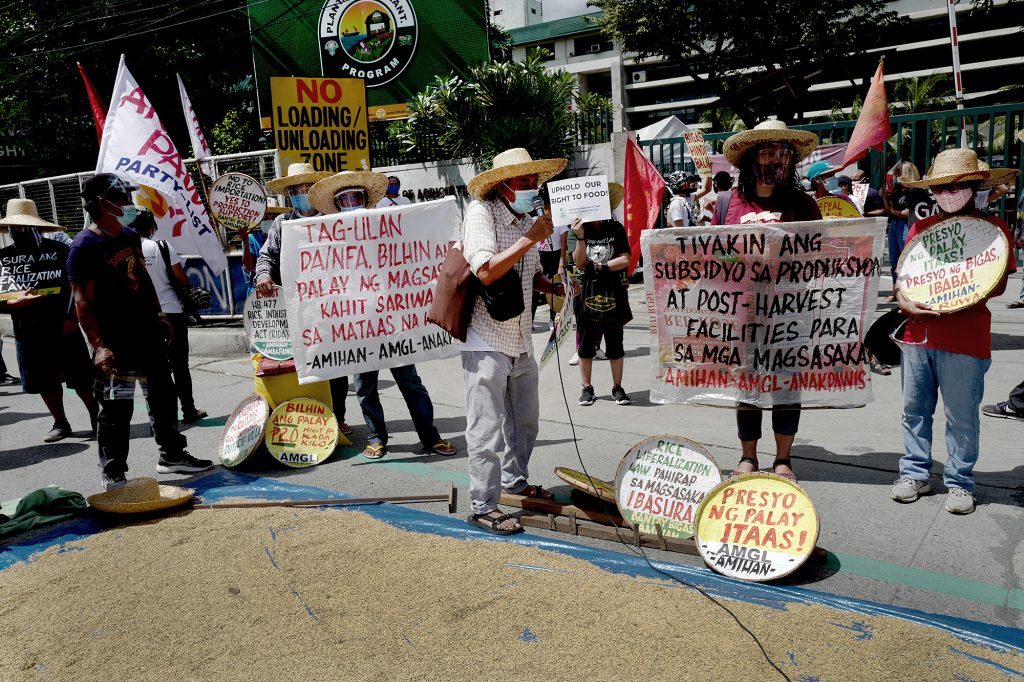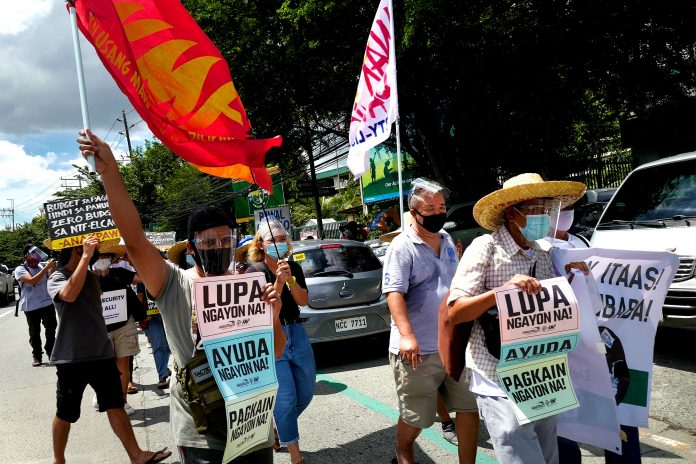For some Filipino farmworkers, there is nothing to celebrate about World Food Day today, October 16, as “food sovereignty” is reportedly being threatened.
World Food Day is an international day celebrated every year to mark the founding of the Food and Agriculture Organization of the United Nations in 1945.
Activist groups in the Philippines and several other poor countries dubbed the day “World Hunger Day.” The militant labor group Kilusang Mayo Uno called it “World Foodless Day.”
The activists said the observance this year amplifies the call for “meaningful socio-economic reforms” to recover from the pandemic and economic crisis.
Around the world, the World Health Organization estimated a fatality of 10,000 children per month due to malnutrition amid the coronavirus pandemic.
“It is alarming,” said Jerome Adonis, secretary general of the labor group Kilusang Mayo Uno. He said the economic crisis became more defined during the pandemic.
The trade union said the “decades-long neoliberal policies” imposed by foreign powers in the Philippines “are to blame for our lack of food security.”
“Food sovereignty, the labor group claimed, must be tied with the broader fight for national sovereignty.
Adonis said genuine land reform is one of the twin pillars of genuine socio-economic reform that will bring prosperity to the Philippines, the other being national industrialization.
Workers joined peasant groups and other sectors in a protest march in Manila on Friday to call for land, food, and economic aid as immediate relief during the pandemic.
Human right to food
In the central Philippines, a group of farmers called on the government for “reflection and action to protect the human right to food of Filipinos.”
Activist group Katarungan said the coronavirus pandemic came at a time of “general retreat” in agriculture in many rural areas in the country.
Jansept Geronimo, the group’s spokesperson, said the lockdowns due to the pandemic also “worsened” the situation in rural communities due to the closure of markets.
“The inability of the country to feed its own citizens amidst the pandemic manifested in hunger situation that continues to worsen,” said Geronimo.
A survey done by the Social Weather Stations showed that 20.9 percent of Filipinos experienced involuntary hunger at least once in recent months.
For the month of July alone, hunger was up 4.2 points from 16.7 percent in May, and by a total of 12.1 points from 8.8. in December 2019.
Geronimo said “despite the importance of food access and the role that food producers’ play [during the pandemic], food production and distribution are never really given serious attention in the government’s COVID-19 response.”
Geronimo said the government should push for the strengthening of the capacity of small food producers to feed the country.
“This entails the localization of food system where production is reclaimed by small scale farmer-producers through asset reforms and redirection of food production toward satisfying the food needs of local communities and poor consumers,” he said.
The group also called for food security, including the provision of “comprehensive and subsidized” farming support, improving sustainable farming technologies and enabling market access.

Plantations threaten food security
The Union of Agricultural Workers in the country warned that the expansion of commercial plantations threatens “food sovereignty.”
The group said at least 1.2 million hectares of land in the Philippines are already under “Agribusiness Venture Arrangements.”
Antonio Flores, chairperson of the union, said that if these vast amounts of arable land were devoted to rice and corn, it would be a major contribution to food production.
Given the average yield of 75 sacks of rice grain in a hectare per harvest, no less than 180 million sacks of rice can be produced every year, noted Flores.
In the southern Philippine region of Mindanao, as much as 782,116 hectares or 19 percent of the region’s 4.1 million hectares of agricultural land have been planted with banana, pineapple, rubber, oil palm and other export crops.
Much of this vast terrain used to be the source of staple food crops such as rice grains, corn, cassava, and root crops.
On a national level, from 2002 to 2017, the annual rate of expansion of land planted with oil palm is 7.12 percent, Cavendish bananas, 4.42 percent, and pineapples, 2.43 percent.
These figures far exceed the expansion rate of rice fields at 1.27 percent and of corn fields, which is already at -1.18 percent.
Flores warned that a provision in the “Agribusiness Venture Arrangements” stipulates that the corporations dictate the price of the crop produced by the growers.
Growers cannot also sell their produce to any third party as they can be penalized and/or charged by the corporation for breach of contract.
In Polomolok, South Cotabato province, new three-year contracts between Dole Philippines and growers stipulate that for every 30 tons of pineapples per hectare produced, the buying price is 5 pesos per kilogram, way below the farm gate price of 10.89 pesos per kilogram.
A kilogram of fresh Dole pineapple is sold at 120 pesos in supermarkets, while it is sold at an online market in Singapore at S$7.50 or 268.38 pesos per piece.
Ronald Reyes contributed to this story from Tacloban









